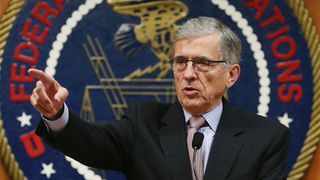Wheeler: Shared 5G Network Would Be Win-Win-Win

Former FCC chair Tom Wheeler said a shared 5G network with the government as one of the players makes more sense than letting T-Mobile and Sprint merge under the argument that such a merger will help beat China to next-gen (5G) wireless service.
That came in a Brookings Institute blog in which Wheeler, a visiting fellow, governance studies, at the Center for Technology Innovation, suggested the Trump administration was on the right track, or at least in the right ballpark, with a leaked National Security Council study arguing that, in the interests of national security, the government should consider essentially nationalizing a new high-speed 5G network.
Wheeler said government ownership of that network was an appropriate nonstarter, but that lost in all the pushback was the validity of using a single, shared network rather than having competitors build out redundant facilities.
Related: D.C. Eyes Meld of Sprint-T-Mobile
It sounded a bit like the arguments for mandatory access to the local cable system/broadband providers that built out as essentially regulated monopolies before the days of overbuilding.
Wheeler was making that shared access argument as a counterweight to the argument by Sprint and T-Mobile that they should be allowed to combined the No. 3 and No. 4 wireless carriers to help build out 5G faster.
Wheeler said the "China is winning on 5G" argument was likely the only one the two companies could come up with after the government has twice rejected their previous bids to merge, but he added that the newest argument had a big hole.
Broadcasting & Cable Newsletter
The smarter way to stay on top of broadcasting and cable industry. Sign up below
"The problem with the 5G rationale is that both companies have previously promised to be competitive in 5G," he said. "Before the transaction was announced, T-Mobile had promised to roll out 5G in 30 American cities this year. In comparison, AT&T has announced 12 cities and Verizon 11 cities. Sprint promised their 5G rollout would begin early next year."
Wheeler, who formerly headed the Wireless Association, said that sharing network infrastructure "in order to better allocate capital and thus expand service to more people is not a radical idea; the wireless industry has done it before."
Wheeler said having the government work with wireless carriers to build a privately-owned, shared network, would be a win-win-win proposition: "Win #1: Keep wireless competition vibrant and consumers as the winners. Win #2: Build a 5G network as fast as possible that serves more Americans than redundant networks would. Win #3: Protect the national interest with an American-owned 5G network protected by American cybersecurity."
Implicit in the proposal is a fourth win for opponents of further consolidation -- obviating the need for T-Mobile and Sprint to merge.
Contributing editor John Eggerton has been an editor and/or writer on media regulation, legislation and policy for over four decades, including covering the FCC, FTC, Congress, the major media trade associations, and the federal courts. In addition to Multichannel News and Broadcasting + Cable, his work has appeared in Radio World, TV Technology, TV Fax, This Week in Consumer Electronics, Variety and the Encyclopedia Britannica.

